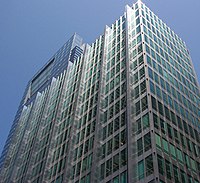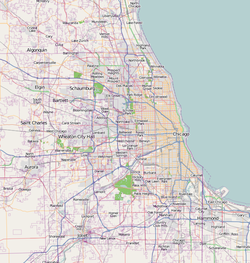Inland Steel Building
| Inland Steel Building | |
|---|---|
 | |
 | |
| General information | |
| Location | 30 W. Monroe Street[1] Chicago, Illinois |
| Coordinates | 41°52′52″N 87°37′45″W / 41.8810°N 87.6291°W |
| Construction started | 1956 |
| Completed | 1957[1] |
| Height | |
| Roof | 332 feet (101.2 m)[2] |
| Design and construction | |
| Architect(s) | Skidmore, Owings & Merrill[1] |
| References | |
Inland Steel Building | |
| Location | 30 W. Monroe St., Chicago, Illinois |
| Coordinates | 41°52′51″N 87°37′43″W / 41.88083°N 87.62861°W |
| Area | 0.5 acres (0.2 ha) |
| Built | 1958 |
| Architectural style | International Style |
| NRHP reference No. | 09000024[3] |
| Added to NRHP | February 18, 2009 |
The Inland Steel Building, located at 30 W. Monroe Street in Chicago, is one of the city's defining commercial high-rises of the post-World War II era of modern architecture.[1] It was built in the years 1956–1957 and was the first skyscraper to be built in the Chicago Loop following the Great Depression of the 1930s.[4] Its principal designers were Bruce Graham and Walter Netsch of the Skidmore, Owings & Merrill architecture firm.[1]
Architecture

The use of brushed stainless steel cladding reflects the corporation that commissioned the building as its headquarters, the Inland Steel Company.[1]
The placement of all structural columns on the building's perimeter—and the consolidation of elevators and other service functions in a separate tower—allowed for a highly flexible interior floor layout with no interior columns.[1] This design is a good example of the widely held principle of the era, "form follows function" (Louis Sullivan). The lobby features a sculpture of gold, stainless steel and enameled copper by Richard Lippold entitled Radiant I.[5]
The Inland Steel Building was designated a Chicago Landmark on October 7, 1998.[1]

References
- ^ a b c d e f g h i "Inland Steel Building". City of Chicago Department of Planning and Development, Landmarks Division. 2003. Retrieved 2012-12-16.
- ^ "Inland Steel Building". Emporis Corporation. Retrieved 2008-02-08.
- ^ "National Register Information System". National Register of Historic Places. National Park Service. July 9, 2010.
- ^ Schulze, Franz & Harrington, Kevin (2003). Chicago's Famous Buildings (5th ed.) Chicago: University of Chicago Press, p. 75. ISBN 0-226-74066-8.
- ^ Marter, Joan. The Grove Encyclopedia of American Art, (Google Books link), Oxford University Press, 2011, pp. 172-73, (ISBN 0195335791), (ISBN 9780195335798).



